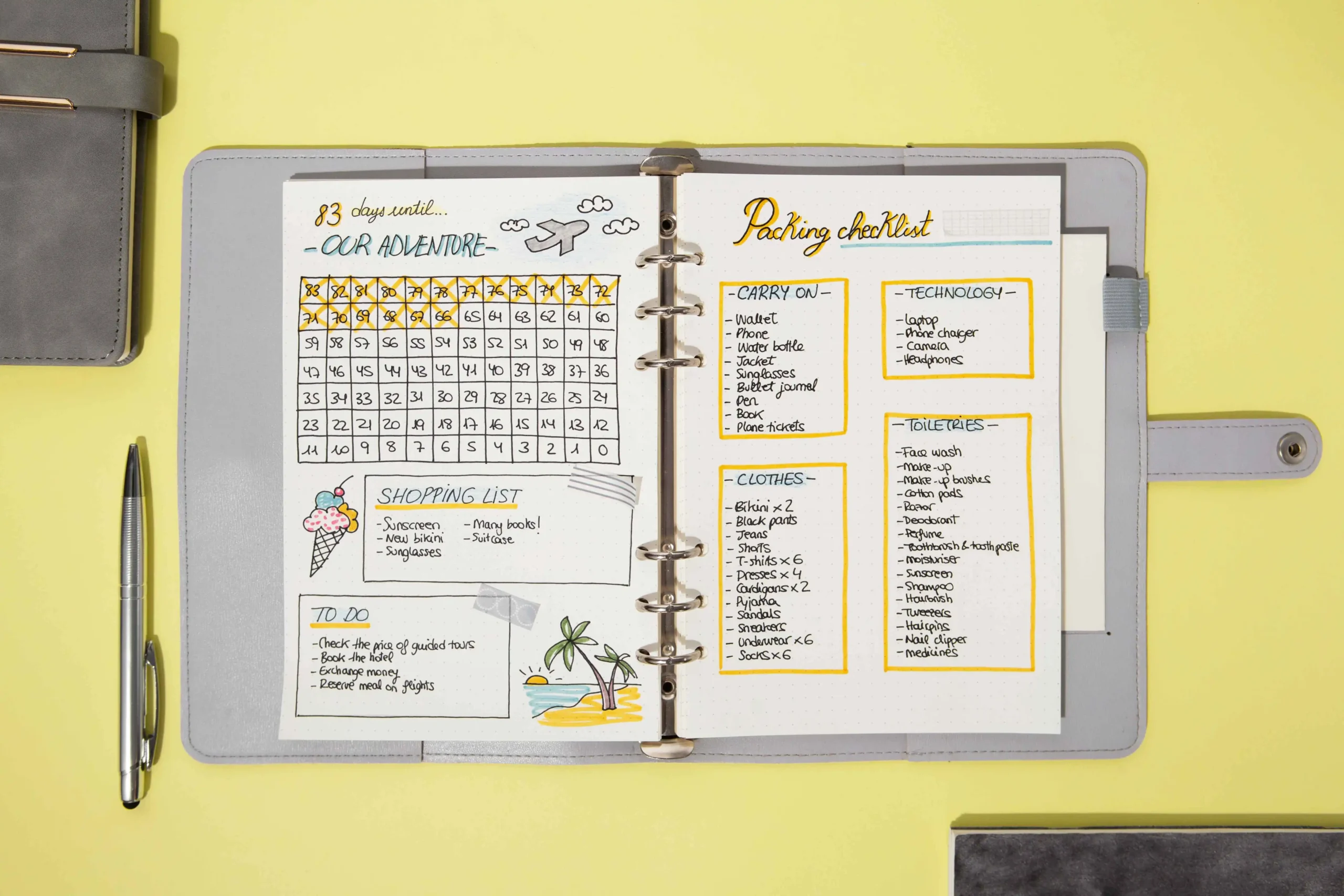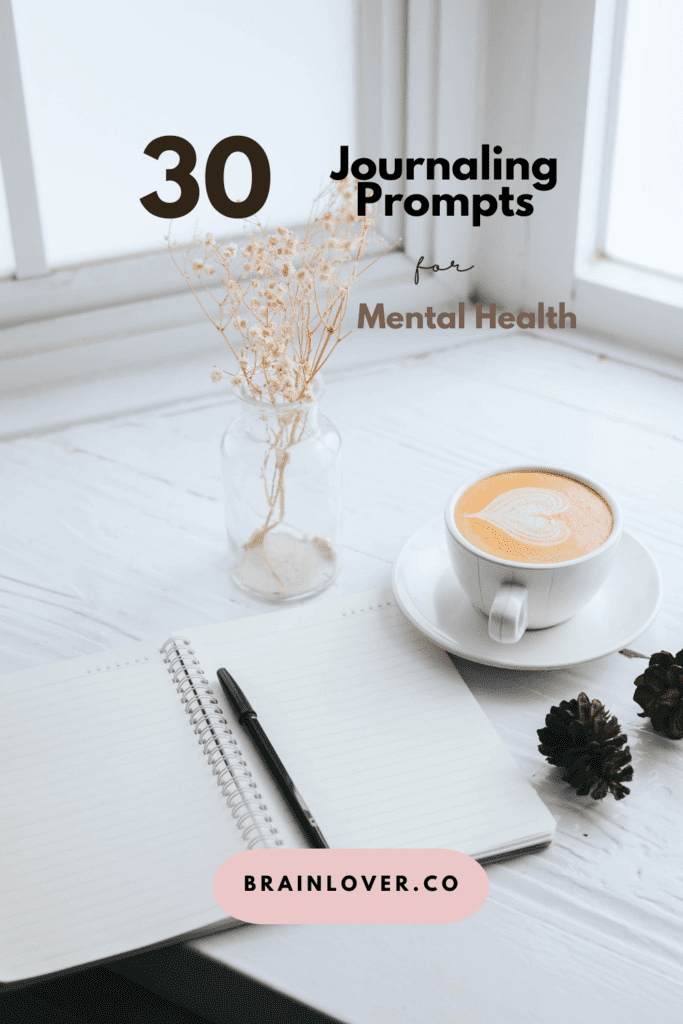Exploring Journaling Ideas for Better Mental Health + 30 Prompts Journaling

Many of us have experienced the overwhelming feeling of stress or anxiety at some point in our lives.
With the ongoing pandemic, we are in a world where stress and anxiety have become part of our everyday lives, affecting our mental health in unprecedented ways.
One of the most effective ways to manage mental health is through journaling. Journaling is an excellent tool to help process thoughts and emotions, release tension, and improve overall well-being.
This blog post will look at journaling ideas that can help improve your mental health.
📓 Journaling as a Therapeutic Tool 🖋️✨

Journaling is a form of therapy that has been in use for many decades. Many therapists recommend journaling as part of a treatment plan for mental health issues.
Journaling provides a safe space to express your emotions and thoughts, without feeling judged or misunderstood.
When using journaling as a therapeutic tool, you can describe your situation, identify your feelings and thoughts, and gain insight into the root causes of your issues.
By confronting these problems through journaling, you can work to create strategies that help you cope better and improve your mental health.
📝 Benefits of journaling ✨

Journaling has numerous benefits that can improve both your mental and emotional well-being. These include:
- Reducing stress and anxiety
- Improving memory and focus
- Enhancing creativity and problem-solving skills
- Boosting self-confidence and self-awareness
- Providing a safe outlet for emotions
- Improving communication skills and relationships
- Helping to understand better and manage mental health issues, such as depression or anxiety.
📝✨ How to start journaling for Mental Health ✍️🧠

If you’re new to journaling, here are some tips on how to get started:
- Find a comfortable writing space: Choose a quiet and private place where you can write without any distractions.
- Set aside time: Make journaling a regular part of your routine, whether it’s daily, weekly, or whenever you feel the need to write.
- Write freely: Don’t worry about grammar or spelling mistakes. The important thing is to express yourself honestly and without judgment.
- Use prompts: If you’re unsure of what to write, try using prompts such as “Today I’m feeling…” or “I am grateful for…” How do I want to feel…”
- Be consistent: Stick to your journaling routine, even if you don’t feel like writing. Consistency is key in making journaling a beneficial habit.
- Reflect on what you’ve written: Take some time to reflect on your entries and look for patterns or insights that can help
By incorporating journaling into your daily routine, you can experience these positive effects and improve your overall quality of life.
📝 Different Approaches to Journaling ✨

There are many types of journaling techniques that you can use to support your mental health.
Firstly, you can try free-writing, where you write down any thoughts and emotions that come to mind, without any specific goal in mind.
Alternatively, you may want to try gratitude journaling, where you write down things that you are thankful for each day.
You can also try a bullet journal, where you can organize and track your daily tasks and goals.
Additionally, you can try creative journaling, such as doodling or collaging, to help express your emotions.
Journaling offers a space where you can converse with your inner self. It’s a platform where you can:
- Reflect on your day, understanding what made you smile or what challenged you.
- Vent out any frustrations or anxieties. Trust me, your journal won’t judge.
- Celebrate your small victories. Did you finally try that new recipe or take a short walk? Celebrate it!
- Plan and dream. Where do you see yourself next year? Or in five years?
📓 Getting started with journaling ✍️
Starting a journal can feel overwhelming, especially if you’re unsure where or how to begin. Here are some steps to get you started:
- Choose a journal or notebook that resonates with you and feels comfortable. There are various options available, ranging from blank pages to pre-designed templates.
- Establish a consistent time for journaling every day, whether it’s in the morning or before bed. Decide on a specific duration for each session, whether it’s 10 minutes or an hour.
- Remember, when journaling, write for yourself. Don’t worry about spelling mistakes or grammar errors. Journaling is all about personal expression, not a graded assignment.

📔 30 Prompts of Journaling 🖋️📖
- Delve into the underlying reasons behind your decision to start journaling. What emotional or cognitive processes led to this choice?
- Visualize your perfect space for journaling. What sensory elements are present that enhance your focus and creativity?
- Identify five emotions that surfaced today. Can you trace them back to specific events or interactions?
- Reflect on a childhood memory that still resonates with you today. How does it shape your current beliefs or behaviors?
- Envision where you want your journaling journey to be in the short-term and long-term. What milestones do you want to achieve?
- Share a recent obstacle you encountered and the strategies or mindset shifts that helped you navigate it.
- List three moments or things from today that filled you with gratitude. What deeper significance do they hold for you?
- Draft a message to your future self, capturing your current aspirations and the wisdom you wish to impart.
- Think of a quote or phrase that holds special meaning for you. What personal experiences or values does it echo?
- Share about someone who has left a lasting imprint on your journaling path. What qualities or lessons from them do you cherish?
- Explore the tools and methods you gravitate towards in your journaling. Why do these resonate with you?
- Discuss a recent read that stirred your thoughts or emotions. How has it influenced your journaling or perspective?
- Revisit a past error or misjudgment. What insights or growth emerged from this experience?
- Describe a recent dream and your interpretations. What subconscious themes or messages might it be conveying?
- What subjects or themes are you eager to dive deeper into within your journal?
- Celebrate a recent achievement. How did it impact your self-worth or perspective?
- Describe a destination you’re drawn to. What experiences or learnings are you seeking from this place?
- Recall a spontaneous gesture of kindness you were part of. How did it impact your view on human connections?
- Reflect on the transformative power of journaling in your life. How has it shifted your self-awareness or worldview?
- Revel in a recent moment of unexpected happiness. What made it so memorable?
- Think about a habit you’re aiming to cultivate or discard. Draft a step-by-step plan to guide you.
- Share an interaction or event that provoked a shift in your thinking. What new perspectives did it introduce?
- Compare your experiences with digital and analog journaling. Which medium aligns more with your journaling philosophy and why?
- Dive into a song that’s been echoing in your mind. What narratives or emotions does it evoke for you?
- Discuss strategies you employ when faced with creative stagnation or lack of motivation to journal.
- If you could converse with any historical or fictional character, who would it be and what profound questions would you pose?
- Reflect on a piece of art, film, or literature that deeply moved you. What emotions or revelations did it spark?
- Address a personal fear. What steps are you taking to confront or understand it?
- Discuss a recent life transition. How are you navigating the emotions and challenges it presents?
- Define “self-care” in your own terms. How does the act of journaling contribute to your well-being?
By following these steps, you can embark on a rewarding journey of self-reflection and personal growth.
Happy journaling! 📔✨
In conclusion, journaling is a powerful tool that can help improve your mental health in many ways.
By writing down your thoughts and emotions, you can gain insight into your mental state, and identify triggers, patterns, and coping strategies.
Journaling can help you track your personal growth, provide stress relief, and boost your creativity.
It’s a free, accessible, and easy way to take care of your mental health, and it’s a practice that you can do anywhere and at any time. So grab a pen and paper, open a blank document, and start journaling today!
Sending you loads of positive vibes and encouragement! 🌸✍️









